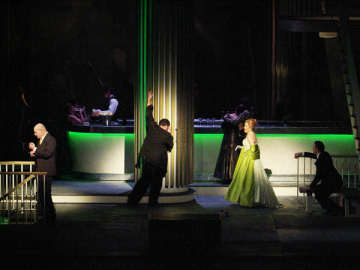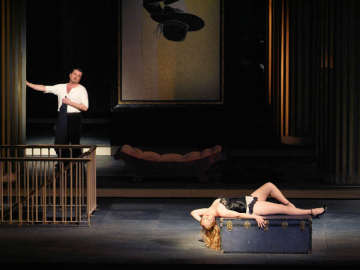|
Editorial Board
Melanie Eskenazi Webmaster:
Bill
Kenny
|
Seen and Heard
International Opera Review
Henze, Boulevard Solitude: production from Covent Garden, London. Soloists and orchestra of the Gran Teatre del Liceu, Zoltan Pesko (conductor); Barcelona, Spain. 5.03.2007 (MM)
Such was the case with Hans Werner Henze's Boulevard Solitude, March 2 - 15. The production by Nikolaus Lehnhoff from London's Covent Garden won the prestigious Laurence Olivier Award for best opera production in 2002 [this year's winner was the David Alden production of Jenufa at the English National Opera]. Boulevard Solitude is Henze's first opera, premiered in 1952, thus the London production marked its fiftieth anniversary. It should have renewed interest in Henze's sizeable operatic catalogue but seemingly it has not.
Like Elegy for Young Lovers and other early Henze works, Boulevard Solitude is based on a bleak story, here that of Manon Lescaut. The atmospheres of the immediately post World War II years were pessimistic, and the old Manon tale (the Abbé Prévost's novel published in 1731) fits perfectly into this milieu. The sentimental crux of this Henze Manon episode is not however Manon, rather it is Des Grieux who, as the opera's text explains from time to time, is Orpheus bemoaning the loss of his beloved Euridice.
While Manon loves her young student, immersed as young men will be in ideas and ideals of art, Manon herself cannot abide art, i.e. modern art, a dislike shared by her brother Lescaut and her sugar-daddy Lilaque. This final, and most serious example of her moral dissolution precipitates her downfall when, involved in an art theft, she is led to assault Lilaque by her unscrupulous brother, Lescaut.
The immediate inspiration for the opera was the film Manon by Henri-Georges Clouzot (winner of the Venice Film Festival in 1949). The film was no doubt the inspiration for the Lehnhoff production as well, as this is opera at its most cinematic. The seven scenes of the opera all occur in a large, architecturally neo-classical train station, a réverie of Armand Des Grieux as he sits dazed on his trunk down stage center, his dream state superimposing the various locations in the story onto the train station. The Wozzeck-like interludes of Henze's opera are used to move people in and out of the station, creating the bustle of activity behind the dream, the frenetic humanity that engenders such a story.
Never for a moment are we left without strong visual images in the brilliantly designed sets and costumes by Tobias Hoheisel, enlivened by director Lehnhoff and choreographer Denni Sayers who moved a huge crowd of train passengers in, through and out of the station - forty-eight actors and dancers, aurally augmented by off-stage choruses comprised of twenty-six men and women, and twenty-six children. Big, yes indeed, and immensely impressive.
The strong and unrelenting visuals and the graphic staging of the principal scenes were completely at home with Henze's music, with the result that the music seemed to disappear into the scenography. Henze wrote Boulevard Solitude in his early, melodic twelve-tone technique; quite beautiful music. These fifty-five years later it is in fact and feel not contemporary music, but music from another time, easily understood and appreciated. Much is made of Henze's inclusion of jazz idioms in Boulevard Solitude, though they are used to make dramatic points (the intrusion of the outside world into the strange Manon/Des Grieux intimacy) rather than as a technique for emotive musical elaboration, this reserved for Henze's rich twelve-tone palette.
Barcelona convened a superb cast to serve Lehnhoff's production, including Pär Lindskog from the original Covent Garden production as a hypersensitive Armand. Laura Aikin made a dynamite Manon visually and vocally and Tom Fox brought cinematic reality to the despicable Lescaut. The casting of Hubert Delamboye and David Menéndez as Lilaque pere and fils respectively was puzzling in the over-the-top context of the three principals. Perhaps a bit less sharply defined than in the London original, the actors and dancers still made the needed effect. It was virtuosic staging virtuosically executed.
The conductor was the Hungarian Zoltan Pesko, serving the production dutifully, very ably managing the orchestral forces of the Liceu and the complex vocalism of the stage.
One yearns to know the original 1952 staging of Boulevard Solitude, for which the legendary stage director Jean-Pierre Ponnelle made his professional debut as the designer. One also yearns for the opportunity to hear rather than to see Henze's Boulevard Solitude interludes. And finally one yearns for more, high-level productions of Henze operas such as this Covent Garden endeavor.
Michael Milenski
Pictures © Antoni Bofill
Back to the Top Back to the Index Page |
| ||
|
||||




